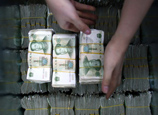
Last, the big rate of depreciation of the yen with such a fast speed is rare in recent years and the impact should not be underestimated.
Higher doses of drug will cause higher toxicity. Problems caused by Abenomics are more than those which have been solved. First, Japan's debt has been among the highest in the world, more than twice its GDP. Measures of expanding government spending to stimulate economy make its debt problem even more serious. They are not sustainable.
Second, Abe’s hope to use inflation to help Japan’s economy go out of the stagnancy can only help to improve the balance sheet and stock market. It is unable to penetrate into real economies. The move will raise deficit, shrink people’s wealth, lower purchasing power and hit the fragile financial system again. The IMF estimates that Japan’s budget deficit is equal to 8.6 percent of its economic output.
Third, devaluation of the yen harms its neighbors and causes huge impact on international financial order.
Fourth, devaluation of the yen has not solved the Japan export-import imbalance.
According to figures from the Japan’s Ministry of Finance, Japan's trade deficit in February hit record high of 777.5 billion yen, which may be the tip of the iceberg of the bad results caused by Abenomics.
For the weak Japanese economy, Abenomics cannot cure diseases but sinking deeper and deeper into the mire.
The story is written by Wu Zhenglong, vice director of China's National Committee for Pacific Economic Cooperation.
Read the Chinese version: 解药还是毒药
, source: Jiefang Daily, author: Wu Zhenglong

















 Snowfall hits Taiyuan, N China
Snowfall hits Taiyuan, N China


![]()
